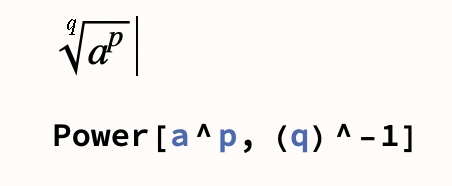
I selected the Tex converted form; copied it as PlainText; pasted into a cell to force into InputForm. I had removed the () around the p as well.
Now if I copied the cell and convert to StandardForm via the convert menu item no copying, I get this:
(a^p)^(1/q)
So....is there a bug going on here or am doing something wrong to get from the converted Tex to InputForm?
Oy, now am wondering if I have to redo the work I did last night.
Consider this:
PowerExpand[Power[Power[a, (1/q)], (1/p)] == Power[a, (1/pq)]]
So this returns evaluated but still not True. But notice the slight change in the typesetting when its evaluate, could that prevent the failure. I tried various Assumptions, nothing works.
So from what I read about Surds, I should use that instead of Power? Since it gives real-valued nth root of x.